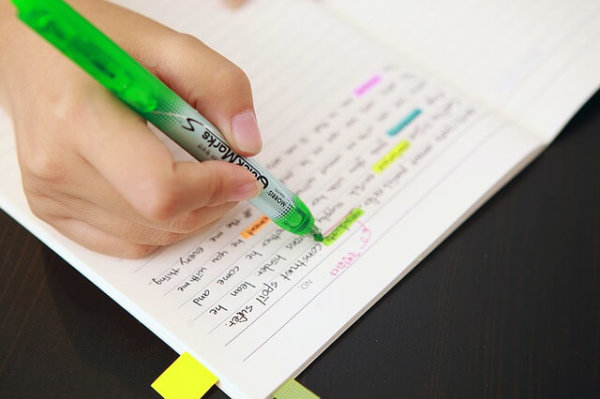

If you are studying a language either in school, at a higher level or just as a hobby, you’ll undeniably have some great reasons for doing so. There is a vast range of benefits to studying a language, including (but not limited to!) travel opportunitites, career progression and opportunities, making friendships and relationships, getting into a great college/university.
However, like with any other subject, if you choose to study a language qualification then you’ll inevitably need to pass at least one exam. Exams for many are stressful and can make us feel under pressure, which can sometimes lead to us not producing our best work! Language exams can be particularly tricky, especially with extended writing and translation pieces, as there isn’t a definite right or wrong answer! This can make studying for language exams a tricky time, but it doesn’t have to be all bad! We have some study tips and tricks that should help make the experience a little less stressful and help you to ace your language exams!

General study techniques and tips
Talking about study in general, there are some techniques that apply to all different subject areas, not just languages, which can be a great place to start! Time management and organisation are vital areas to practice when you study for exams. Creating a study schedule to allocate your time wisely and fairly between your subjects, as well as factoring in breaks and time for social activities. Another tip is to organise your notes in a way that is visually stimulating. Lots of different colours, sticky notes and highlighting is a great way to stimulate your memory, associating a color to a concept. Other techniques include working in pairs, which is especially good when you need to practice oral skills, performances and practical skills.
How to study for language exams
Looking deeper into how to study languages in order to maximise your grade in a test. There are lots of study tips and techniques that compliment language learning and help to improve your confidence, make vocabulary stick and help you to memorize tricky grammar patterns…
1. Divide equal time to the four skills
We mentioned earlier about creating a study schedule so that you divide your time equally between subjects. With language exams you can also do this within the different areas you will be tested on. For example, you should devote equal time to reading and comprehension practice, writing and translation practice, listening practice and speaking practice. The four skills also compliment each other exceptionally, so when you’re practicing reading you’ll inadvertently be practicing translation too, and when you’re practicing speaking, you’ll be practicing listening as well.
2. Immerse language study into everyday life
This tip must be the easiest one to adopt, but can have a great impact on your language study and ultimately your final test grade! Learn effortlessly by watching popular movies in your target language, listening to your favorite native speaking artists of your target language. We also recommend tuning into radio stations broadcasting in the target language, as this will expose you to lots of conversational material that will be valuable for your listening and speaking exams.

3. Find a language buddy
If you’re in school or college, ask one of your classmates to study with you, or if you’re learning independently look into trying a language exchange. Having a language buddy not only keeps you motivated to stay on track with your studying, but it means you have someone to practice speaking and listening with. Another tip is that you and your buddy set a writing task and read your buddy’s work, highlighting any mistakes and giving any suggestions to improve it and vice versa.
4. Use language exchange sites
We touched on this briefly earlier, but language exchange platforms are a great way to practice your speaking and listening skills, and they also help to improve your confidence with speaking in the target language. There are lots of different sites including iTalki and Speaky to name a couple. Another tip is to check sites like Meetup for language meetups going on in your area, which are a great way to meet new friends and speak in your target language as well as doing cultural activities.
5. Vocabulary revision tools
Tools like flash cards are a great way to help you nail vocabulary. Little things like the gender and spelling of words can catch us out in tests and cause us to lose marks unneccessarily, so it’s important that you stay on top of this, even if you’re a more advanced learner. Tools like flashcards and FlashSticks notes are a great way to effortlessly learn and remember vocabulary by sticking up the notes around you in places where you will see them every day and labelling the items they translate to.
6. Apps and games
There is a huge variety of language apps, games and translation tools out there on the App Store and Google Play store to choose from. Dictionary and translation tools like WordReference are great for translating a new word you come across quickly and easily. Apps like iTalki, as we mentioned before, are great for speaking practice. Apps like FlashAcademy are great for revising topics in bitesized five minute chunks, and incorporating fun games into your learning. Using apps like these is often fun and is a great way to break up solid study while still being educational.

7. Reading
Reading books, magazines, websites and newspapers in your target language is a great way to expose you to vocabulary outside of class. Examiners expect students to have a wider vocabulary than what is required, and you can ensure this by reading articles or books for as little as five minutes per day. Reading news sites in your target language also makes you aware of current issues in the native countries of the language you are learning. This is a plus because you will often be asked questions based on an article about these issues in the exam, so it’s good to familiarize yourself with those buzzwords. If you have a favorite book series (hello, Harry Potter!) why not try reading the translated version in your target language? A lot of the words will be the same, and you already know the story so the read won’t be too challenging. This is a subtle but beneficial way to incorporate language learning into your spare time.
8. Get to grips with grammar
Although probably the least exciting part of language learning, grammar is one of the most important. A top tip for revision is to create colorful grammar tables for common verbs with the conjugations in a variety of different tenses. This helps you to learn them so that you can be confident with the conjugations when it comes to exams. This is particularly helpful with irregular verbs, which tend to be included in tests as a way to trick you! Make sure you make irregular verbs stand out in your notes, to create a visual memory aid that you can trigger when you see these verbs in the exam. Practice use of different tenses both in extended writing pieces and speaking practice, which will help you get to grips with the conjugations and use them confidently. Learning grammar patterns can be time consuming, but if neglected can make your work in tests less accurate and cost you valuable marks!

9. Keep a working dictionary
If you’re using the techniques mentioned above, such as reading and listening to the radio in your target language, then it’s likely that you will come across lots of different new words in each day. Of course you’ll want to remember these words so that you can recognise and use them in your language exams, so take the time to record them in a personal dictionary. Using a translation app like WordReference or the FlashAcademy Object Translator is great in real-time, but if you don’t actually record the words you translate, it’s likely you’ll forget them quickly. Record the word and its translation and try to make 3 sentences using the word. Examiners look for knowledge and appropriate use of wider vocabulary outside the curriculum, so this is a great way to practice using new words.
10. Timed practice
Whether you access past test papers online or ask your teacher to compile together a mock test for you, timed practice in test conditions is an excellent way to prepare for language exams. Doing just a couple of test simulations in the lead up to the exam will boost your confidence and help you get used to how the exam will be and prepare you for how to manage your time and allocate time for each section of the exam.
Final words of wisdom for taking exams
Whilst all of these study tips and techniques are invaluable when learning languages, when the time of the exam comes around and stress levels rise, it’s easy to feel like you’ve forgotten everything! Make sure you give yourself plenty of time before the exam to study to avoid having to cram the work in to a short time period. We advise against studying on the day of the exam, as you probably won’t learn anything new and it will just stress you out! Other practical tips include making sure you enter the exam prepared with enough pens, water and snacks. Make sure you know the exam venue and your seat number, and that you arrive on time! Eat a good breakfast on the day of the exam and try to get a good night’s sleep before.
Most importantly, if you follow the study tips above and put in maximum effort, you are bound to end up with an excellent result!

